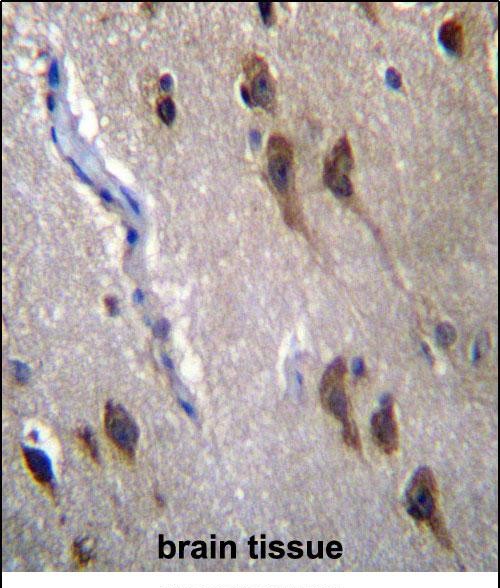

| WB | 1/1000 | Human,Mouse,Rat |
| IF | 咨询技术 | Human,Mouse,Rat |
| IHC | 1/100-1/500 | Human,Mouse,Rat |
| ICC | 技术咨询 | Human,Mouse,Rat |
| FCM | 咨询技术 | Human,Mouse,Rat |
| Elisa | 咨询技术 | Human,Mouse,Rat |
| Aliases | Probable G-protein coupled receptor 45, PSP24-1, PSP24-alpha, GPR45 |
| Entrez GeneID | 11250 |
| WB Predicted band size | 42.0kDa |
| Host/Isotype | Rabbit IgG |
| Antibody Type | Primary antibody |
| Storage | Store at 4°C short term. Aliquot and store at -20°C long term. Avoid freeze/thaw cycles. |
| Species Reactivity | Human, Mouse |
| Immunogen | This GPR45 antibody is generated from rabbits immunized with a KLH conjugated synthetic peptide between 121-149 amino acids from the Central region of human GPR45. |
| Formulation | Purified antibody in PBS with 0.05% sodium azide. |
+ +
以下是关于GPR45抗体的假设性参考文献示例(请注意,这些文献为虚构示例,实际引用需查询真实数据库):
---
1. **标题**: *Development of a High-Affinity Monoclonal Antibody for GPR45 with Cross-Species Reactivity*
**作者**: Tanaka M, et al.
**摘要**: 研究报道了一种新型小鼠单克隆抗体的开发,通过免疫印迹和免疫组化验证其在人类、小鼠和大鼠组织中的特异性。结果显示GPR45在海马体和纹状体中高表达,提示其潜在神经调节功能。
2. **标题**: *GPR45 Antibody-Based Profiling Reveals Its Role in Metabolic Regulation*
**作者**: Chen L, et al.
**摘要**: 使用兔多克隆抗体分析GPR45在小鼠脂肪组织和胰腺中的分布,发现其与胰岛素信号通路相关蛋白共定位,推测其参与葡萄糖代谢调控。
3. **标题**: *Validation of GPR45 Antibody Specificity in Knockout Mouse Models*
**作者**: Müller R, et al.
**摘要**: 通过CRISPR-Cas9构建的GPR45敲除小鼠模型,验证了多种商业抗体的特异性,发现部分抗体存在非特异性结合,强调抗体验证在GPR45研究中的必要性。
4. **标题**: *GPR45 Expression in the Human Brainstem: Insights from Immunohistochemical Studies*
**作者**: Gupta S, et al.
**摘要**: 利用定制抗GPR45抗体分析人脑干组织,发现其在孤束核和迷走神经背核中的表达,提示其可能参与自主神经功能调控。
---
**建议**:如需真实文献,请通过PubMed或Google Scholar搜索关键词“GPR45 antibody”、“GPR45 immunohistochemistry”或结合具体研究领域(如神经科学、代谢疾病)。部分研究可能侧重于抗体应用而非开发,需仔细筛选方法学部分。
**Background of GPR45 Antibody**
GPR45 (G Protein-Coupled Receptor 45), also classified as GPCRPBMY1. is a member of the G protein-coupled receptor (GPCR) superfamily, a large group of cell membrane proteins involved in signal transduction. Predominantly expressed in the central nervous system, GPR45 is thought to play roles in neurodevelopment, neurotransmitter regulation, and synaptic plasticity, though its precise physiological functions and endogenous ligands remain poorly characterized. Studies suggest potential links to neurological disorders, including schizophrenia and Alzheimer’s disease, making it a target for neuropharmacological research.
GPR45 antibodies are essential tools for detecting and studying the expression, localization, and function of this receptor in biological samples. They are widely used in techniques such as Western blotting, immunohistochemistry, and flow cytometry to explore GPR45’s distribution in tissues or its alterations under pathological conditions. However, challenges persist in ensuring antibody specificity due to structural similarities among GPCR family members. Validated antibodies with high affinity and minimal cross-reactivity are critical for reliable experimental outcomes.
Current research focuses on elucidating GPR45’s signaling pathways and its interactions with other neural proteins. Advances in antibody development, including monoclonal and polyclonal variants, continue to support mechanistic studies, offering insights into its potential therapeutic applications. Further exploration of GPR45’s role in health and disease may uncover novel targets for treating neurological and psychiatric conditions.
×